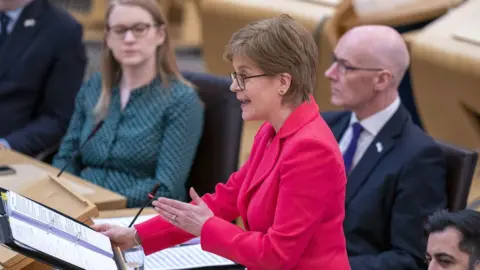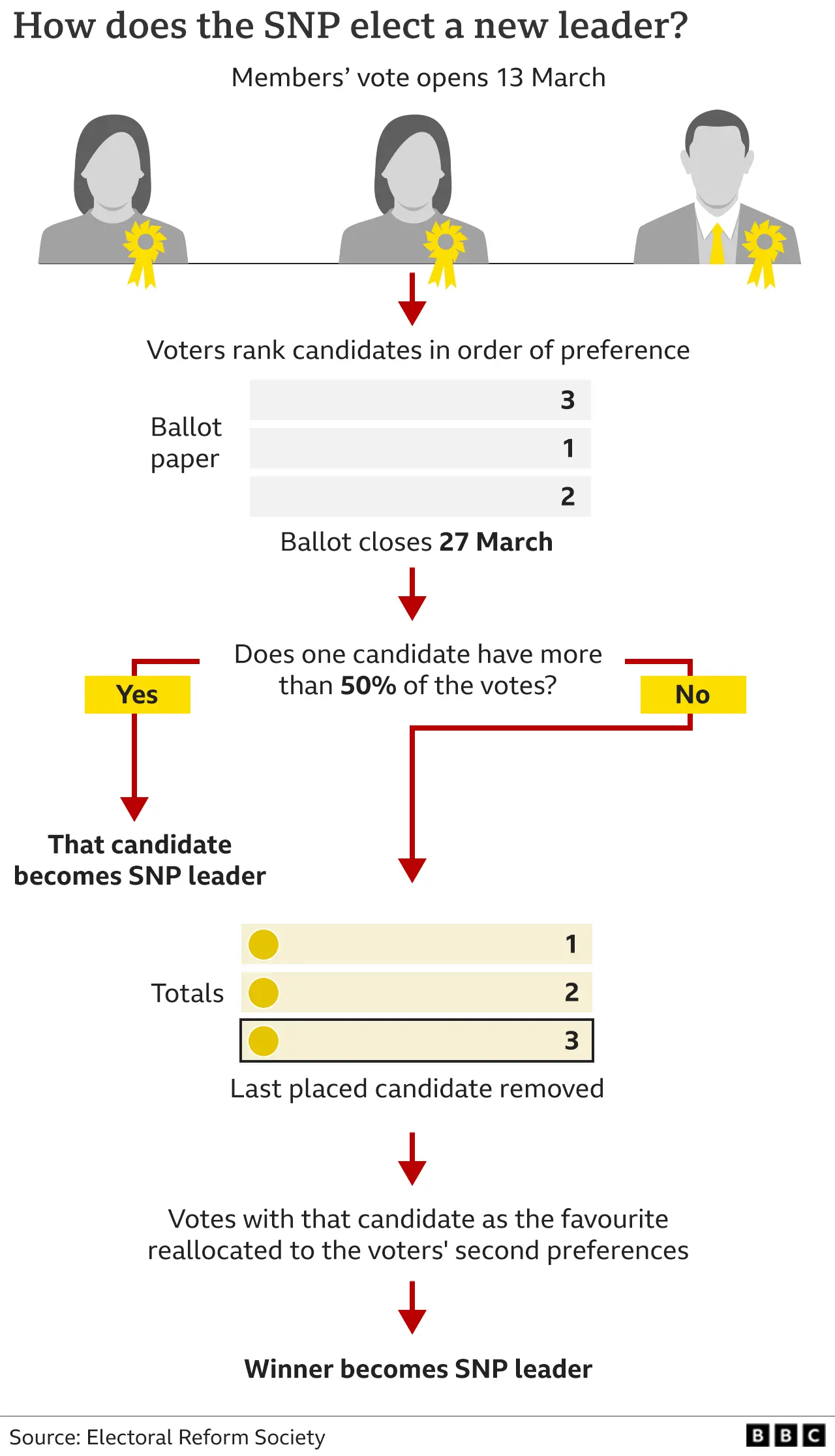SNP candidates predict independence in five years
All three SNP leadership candidates have predicted that Scotland can be an independent country within five years if they win the contest.
Ash Regan, Humza Yousaf and Kate Forbes were speaking as they faced each other in a BBC Scotland TV debate.
Mr Yousaf said he believed the country "can and will be" independent by 2028 in response to a question from an audience member.
Ms Regan and Ms Forbes both said they believed the same.
The leadership contest was sparked by Nicola Sturgeon's surprise announcement that she was quitting as both SNP leader and Scotland's first minister after eight years in the roles.
Recent polls have put support for independence at broadly the same level as it was when Ms Sturgeon succeeded Alex Salmond after the referendum in 2014, which saw Scottish voters reject independence by 55% to 45%.
That is despite the turbulence in UK politics in recent years that saw the country leave the EU despite Scotland voting overwhelmingly in favour of remaining and Boris Johnson's often chaotic time as prime minister.
The Supreme Court has also ruled that the Scottish Parliament does not have the power to hold a referendum without the agreement of the UK government - which has repeatedly made clear that it has no intention of granting formal consent through a Section 30 order.
Mr Yousaf, the health secretary who is the bookies favourite to win the contest and is widely viewed as being Ms Sturgeon's preferred candidate, told the Debate Night Special that he believed he could build sustained majority support for independence that would see those political obstacles disappear.
He added: "I would want to be the one who delivers independence, but to do that you've got to stop talking about process and talk about policy.
"We have got to inspire people with a vision for independence. We have to make sure that we're not obsessing about Section 30s and de facto referendums because people just don't get inspired by that."


Who are the SNP candidates?

Ms Forbes, the finance secretary who is currently seen as being Mr Yousaf's closest challenger for the leadership, said she believed the dial could be shifted in favour of independence by building a case on the issues that people were concerned about.
Using the example of the cost of living crisis, she said: "People can't afford next month's energy bill in a country that is rich in energy in terms of oil and gas and in terms of our renewables. It doesn't stack up because the decisions are being made far, far away from those that are most affected.
"I think we should be using all democratic opportunities to campaign for and make the case for independence but in a way that is respectful of the reasons why people may not be persuaded".
Meanwhile, Ms Regan outlined her plans for what she calls a Voter Empowerment Mechanism that "just uses the ballot box to allow the people of Scotland to say when they are ready to be independent".
She added: "You can use each and every election. So you could start with the next election and then the Scottish election after that. And it's there in the background and then the people of Scotland decide when they're ready to become independent."
Ms Regan quit as the country's community safety minister over the government's controversial gender recognition plans, and is seen as being the outsider in the contest.
She clashed with Mr Yousaf - who is the only one of the three to say he would launch a legal challenge to the UK government's block on legislation - over the case of trans rapist Isla Bryson, who was initially sent to a women's prison.
When asked by Ms Regan why he had not listened to concerns about cases such as Bryson's ahead of the reforms being passed, and whether he regarded Bryson as a man or as woman, Mr Yousaf said: "Isla Bryson should not be in a woman's prison.
"Isla Bryson is a rapist who's completely at it, I don't think they're a genuine trans woman, I think they're trying to play the system."
 PA Media
PA MediaThe candidates also faced questions on topics including NHS waiting lists - with one audience member saying her husband has chronic health problems and is facing a six-year waiting list - as well as the state of Scotland's education system and the government's controversial Deposit Return Scheme.
Ms Regan and Ms Forbes have both said they would pause the scheme, which has faced criticism over its implementation, while Mr Yousaf has pledged to create an exemption for small businesses such as craft brewers.
Ms Regan said: "We can't be putting too many burdens on small businesses. We need to look again at this, we need to involve small business, to come and talk to us about where it needs changed, get it right and then implement it."
Ms Forbes also said small businesses needed a "bit of breathing space".
Mr Yousaf said he would not "slag off" Lorna Slater, the Scottish Green minister responsible for bringing in the initiative which is designed to boost the recycling of single-use drinks containers by adding 20p to the price which is then refunded when the consumer returns it.
He said small firms should be excluded from it for its first year but added: "I can't see any point in pausing the scheme when the big boys, the Coca Colas, the Pepsis of this world, they are already taking part in about 40 DRS schemes across the world. We can't let them off the hook".


There was less trashing of one another in this debate and some consensus between the candidates on what the SNP in government has got wrong.
None of them are happy with the current plans for a deposit return scheme and all three promised to change it in the face of strong criticism from some businesses.
Kate Forbes objected to the proposed ban on alcohol advertising and described long waits in the NHS as "unacceptable".
Humza Yousaf - the current health secretary - found himself apologising for one patient's experience and offered a "hands up" over failures to deliver new ferries on time and on budget.
Ash Regan, who resigned from the Scottish government over gender reform, also called for a review of the SNP's power sharing deal with the Greens.
The trouble with all this criticism is that all three candidates have served for years in the Scottish government and although Ash Regan has now quit and Kate Forbes has been on maternity leave, they all bear some collective responsibility for its performance.
For me, one of the stand out moments in this debate was when an audience member called them out on that, arguing that it was "ridiculous" that they had not done more before now to challenge mistakes.

Voting in the SNP leadership election, which is using the single transferable vote system, opened on Monday with the winner to be announced on 27 March.
The SNP has refused to confirm exactly how many party members will be able to take part in the vote, with its Westminster leader Stephen Flynn telling BBC Scotland earlier on Tuesday that he had "no idea" and that "I think the last time I heard it was about 100,000."
The SNP said its membership had reached 125,000 by 2019, but the Electoral Commission put the figure at 104,000 two years later.
The Mail on Sunday has reported that Southampton-based polling firm Mi-Voice, which is overseeing the leadership vote, has been given the names of just 78,000 members by the SNP.
If this is correct, it would suggest that the party may have lost nearly 50,000 members over the past four years. The newspaper also reported that Mi-Voice expected about 54,000 members to actually submit a vote.
Polling expert Prof Sir John Curtice has said Mr Yousaf currently appears to be the most popular of the three candidates among the SNP members who will be picking the new leader, with Ms Forbes second and Ms Regan third.
But Ms Forbes seems to be more popular than her rivals with both SNP voters and the public as a whole, Sir John said.
He added that it "looks as though there is plenty to play for" and that "maybe everything could turn on the unknown second preferences of Ms Regan's supporters".
Whoever wins the SNP leadership contest will face a Scottish Parliament vote on 28 March to confirm them as the new first minister, before being sworn into office the following day.

